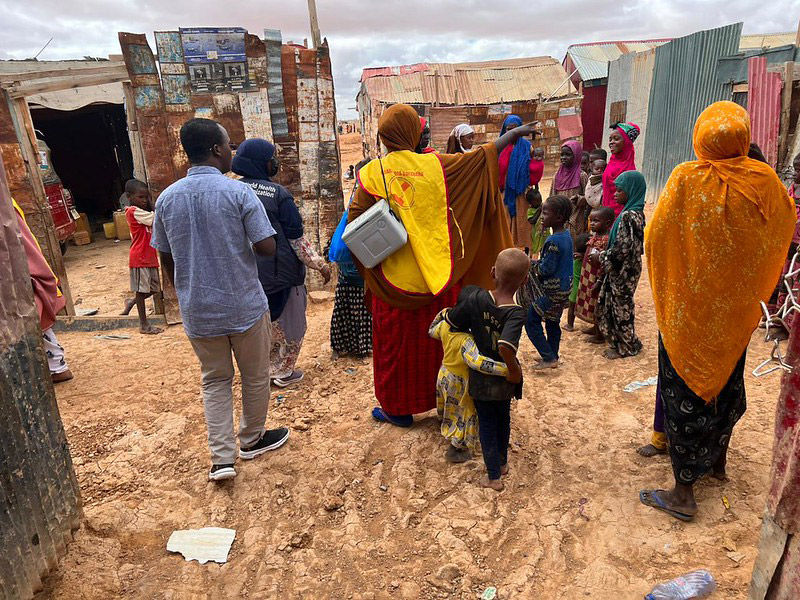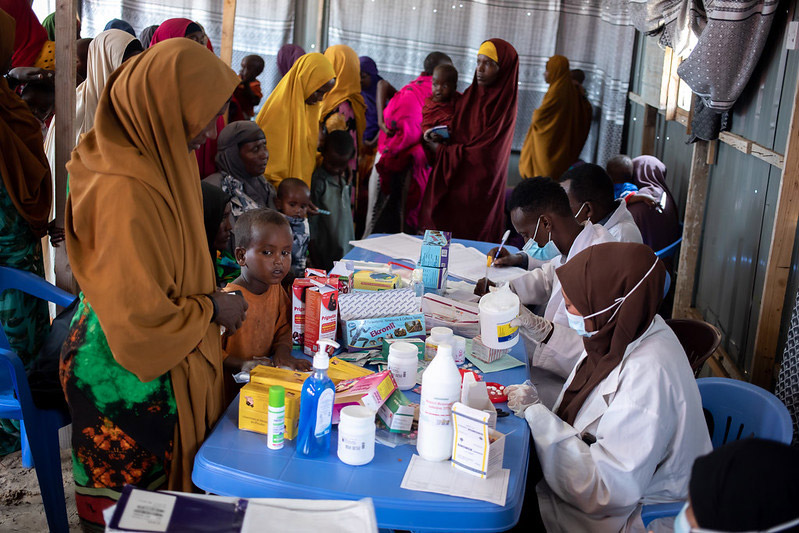 Sarbina Ali, a community health worker visits on average 50 households in the IDP camp to raise awareness about the importance of hygiene and refer patients to available health services including immunization. Photo credit: WHO Somalia/I. Taxta
Sarbina Ali, a community health worker visits on average 50 households in the IDP camp to raise awareness about the importance of hygiene and refer patients to available health services including immunization. Photo credit: WHO Somalia/I. Taxta
22 November 2023, Mogadishu, Somalia – Amid the severe drought crisis in Somalia, Sarbina Ali, a community health worker is bringing hope to internally displaced people seeking refuge in the Daynile district. With the support of WHO and its drought response team, Ali works tirelessly to provide community-level health services and mobilize the affected community to practise healthy living.
Daynile, in the north of the Banadir region, has become a haven for internally displaced people due to its ease of access from Afgoye and Balcad, where conflict and drought have displaced many people. Ali, a mother of 7 children, was selected by Banadir Health Directorate as a community health worker for the WHO-supported drought response. Her familiarity with the area and unwavering commitment to the community made her an ideal candidate for the role.
The WHO country office in Somalia, with funding support from the Foundation for Innovative New Diagnostics (FIND), has deployed community health workers in some of the worst drought-affected districts as part of implementing community-based surveillance. Majority of these community health workers are women, and they belong to the same community where they are deployed. This project aims to help improve the collection and use of timely and accurate health and nutrition data through the community health workers who are providing basic health care in marginalized settings where people have no access to health care either due to geographic accessibility or insecurity. In addition, these community health workers are monitoring health-related events and community alerts for further verification by the rapid field investigation teams. This way, any public health threat before it turns into an epidemic in the community, is identified timely and rapidly contained.
“As someone who has lived here for a long time, I feel a responsibility to welcome and assist the new arrivals and those who are already residing in this camp,” says Ali. “They are our guests, seeking refuge from hunger and violence. I do my best to identify sick and suffering ones arriving at the camp, refer them to WHO-supported health services including immunization, guide them about the schedule of the outreach teams and educate them about healthy living. It brings me joy to serve these people, knowing that they have lost most of their belongings including livestock and been severely affected by the drought.”
 A WHO-supported outreach team offers registration, treatment, and medication for the ailments to displaced persons living at the IDP camp in Daynile district. Photo credit: I. Taxta
A WHO-supported outreach team offers registration, treatment, and medication for the ailments to displaced persons living at the IDP camp in Daynile district. Photo credit: I. Taxta
Ali’s role as a community health worker involves raising awareness among the displaced community about malnutrition, sanitation, hygiene and diseases like acute watery diarrhoea, measles, and COVID-19. Talking about her key challenges, she said that during her door-to-door community mobilization efforts displaced residents often prioritize food over medicine. “I have to consistently remind and educate them both individually and collectively that their living conditions in the camp exposes them to extreme circumstances, therefore, they need to give equal priority, if not more, to their health and hygiene.”
Every day, Ali visits a minimum of 50 households, ensuring that women and children in the camp are familiar with her friendly face. She serves as a vital link between the community and the outreach teams supported by WHO for the drought response. Ali’s dedication and tireless efforts have significantly improved the lives of those he serves.
One particularly heartbreaking incident stands out in Ali’s memory. During a visit to the camp, he came across a woman who was 9 months pregnant and was suffering from malnutrition and other medical conditions, some of which were related to displacement, lack of hygiene and poor living conditions. Upon identifying her, Ali immediately brought her to the WHO-supported outreach team in the camp, to get the life-saving medical attention and treatment. The woman eventually gave birth to a healthy baby girl at the district hospital.
Seeking anonymity due to security reasons, Fartun she said that “Ali was a God-sent help to me when I reached this camp after fleeing from a life-threatening experience from my village—about 150 kilometres from this camp—and I am so grateful to WHO for arranging these services for people like me,” observed Fartun while narrating her experiences. Staunchly dedicated to her work, Ali considers it both a voluntary and moral obligation to serve vulnerable people who have fled drought and war.
Mahmud Hairan, the medical officer at the district hospital observed that “Community based surveillance has helped with timely identification of the sick children and women within the IDP camps and eventually has helped save many precious lives.”
For more information, please contact:
Fouzia Bano, WHO Communications Officer
Email:
Saeed Ahmed, WHO Reporting/EXR Officer
Email:
View the links below for more information:
Drought survivors converge on internally displaced person camps to “live another day”
WHO Representative explains drought situation and response in Somalia (video on Flickr)
[1] Name of the beneficiary changed due to security reasons








